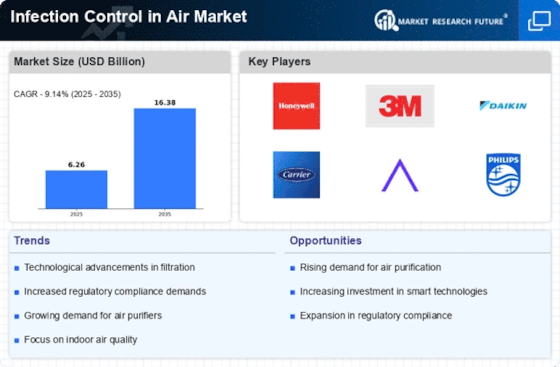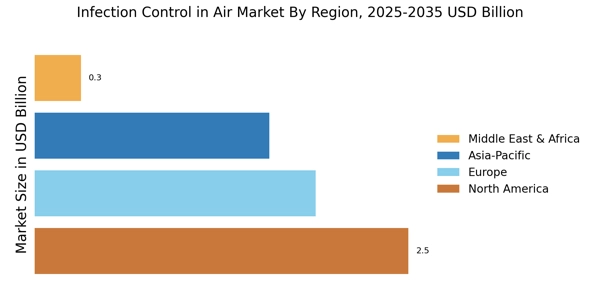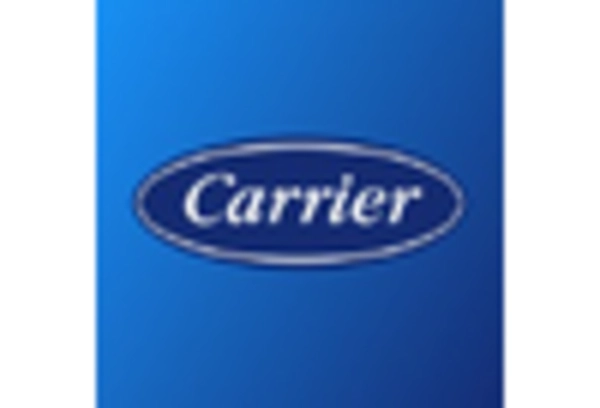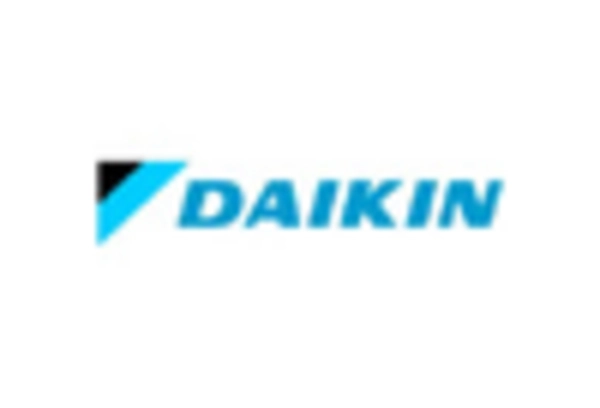Rising Awareness of Health Impacts
The Infection Control in Air Market is witnessing a heightened awareness regarding the health impacts of poor air quality. Research indicates that indoor air pollution can lead to various health issues, including respiratory diseases and allergies. As individuals become more informed about these risks, there is a growing demand for effective air purification solutions. This trend is particularly evident in urban areas, where pollution levels are often higher. Market data suggests that the demand for air quality monitoring and purification systems is expected to increase by approximately 15% in the coming years. This rising awareness is driving consumers and businesses to invest in technologies that ensure cleaner air, thereby propelling the Infection Control in Air Market forward.
Consumer Demand for Sustainable Solutions
The Infection Control in Air Market is increasingly shaped by consumer demand for sustainable solutions. As environmental concerns grow, individuals and organizations are seeking air purification systems that not only improve indoor air quality but also minimize ecological impact. This shift towards sustainability is prompting manufacturers to develop energy-efficient and eco-friendly air filtration technologies. Market analysis indicates that products featuring sustainable attributes are gaining traction, with consumers willing to invest more in solutions that align with their values. This trend is likely to drive innovation within the Infection Control in Air Market, as companies strive to meet the evolving expectations of environmentally conscious consumers.
Regulatory Frameworks Promoting Air Quality
The Infection Control in Air Market is significantly influenced by regulatory frameworks that promote air quality standards. Governments are increasingly implementing stringent regulations aimed at improving indoor air quality in various sectors, including healthcare, education, and hospitality. These regulations often mandate the use of advanced air filtration systems to mitigate the risks associated with airborne contaminants. For instance, the introduction of new guidelines by health authorities has led to a marked increase in the adoption of air purification technologies. This regulatory push not only enhances public health but also drives market growth, as compliance with these standards necessitates investment in effective air control solutions. The ongoing evolution of these regulations suggests a sustained demand for innovative products within the Infection Control in Air Market.
Technological Innovations in Air Purification
The Infection Control in Air Market is experiencing a surge in technological innovations, particularly in air purification systems. Advanced filtration technologies, such as HEPA and UV-C light systems, are becoming increasingly prevalent. These innovations enhance the ability to eliminate airborne pathogens, thereby improving indoor air quality. According to recent data, the market for air purification systems is projected to grow at a compound annual growth rate of approximately 10% over the next five years. This growth is driven by the rising awareness of the importance of clean air in both residential and commercial settings. As consumers and businesses alike prioritize health and safety, the demand for effective air purification solutions continues to rise, positioning the Infection Control in Air Market for substantial expansion.
Increased Investment in Healthcare Infrastructure
The Infection Control in Air Market is benefiting from increased investment in healthcare infrastructure. As healthcare facilities expand and modernize, there is a corresponding need for advanced air quality management systems. Hospitals and clinics are prioritizing infection control measures, which include the installation of sophisticated air filtration systems to reduce the transmission of airborne pathogens. Recent reports indicate that healthcare spending is projected to rise significantly, with a substantial portion allocated to improving environmental controls. This trend not only enhances patient safety but also drives the demand for innovative air purification technologies. Consequently, the Infection Control in Air Market is poised for growth as healthcare providers seek to implement effective solutions to safeguard public health.

















